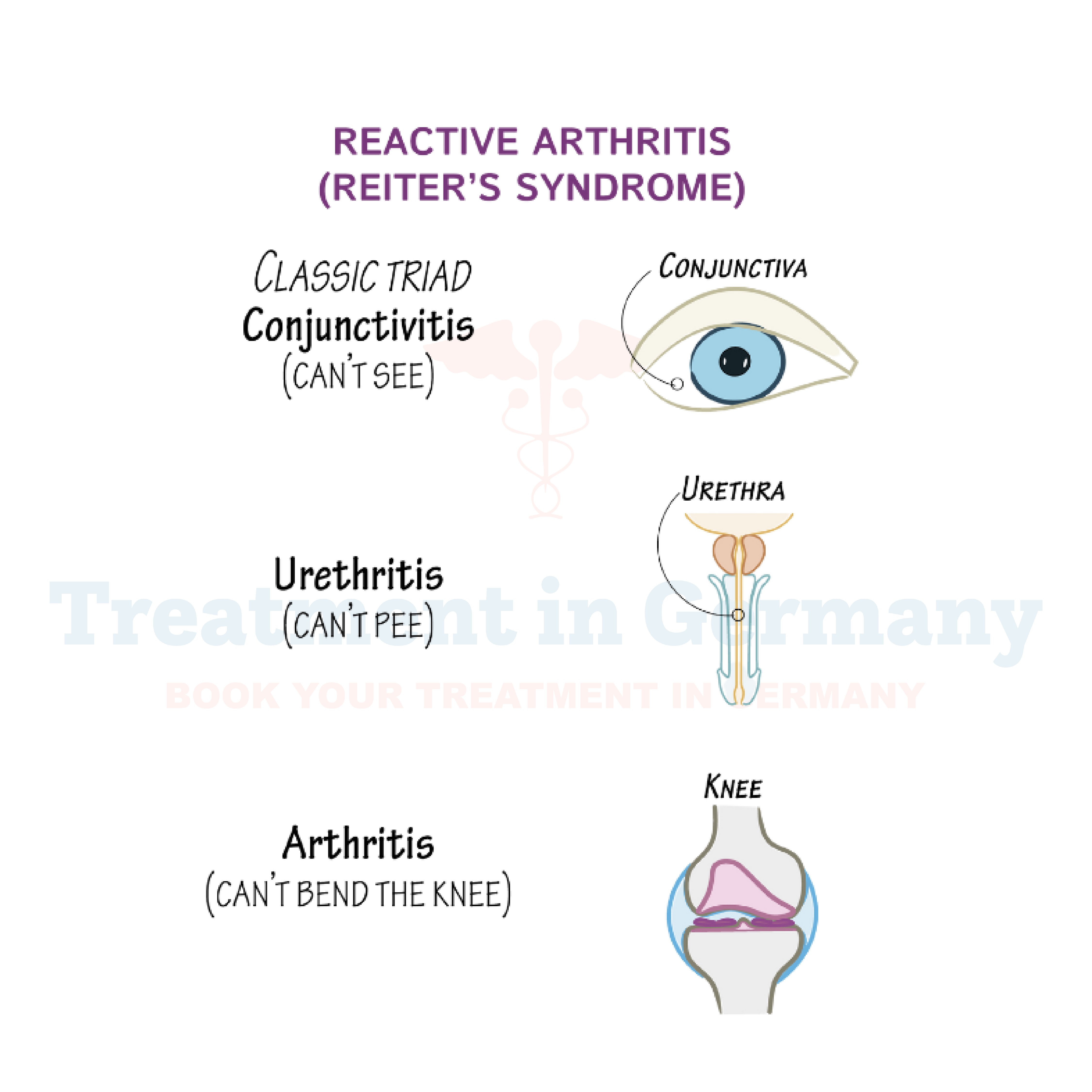What is Reactive Arthritis?
Reactive Arthritis is a type of inflammatory arthritis that typically occurs as a reaction to an infection in another part of the body. This condition usually develops after a bacterial infection in the genitourinary tract, gastrointestinal tract, or sometimes even after a respiratory infection.
The body’s immune system responds to the infection, leading to inflammation in the joints, which is characteristic of reactive arthritis. Common symptoms include joint pain and swelling, particularly in the knees, ankles, and feet, along with possible eye inflammation and urinary tract symptoms.
Side Effects of Reactive Arthritis
The symptoms of reactive arthritis can vary but commonly include:
- Joint Pain and Swelling: Often affecting the knees, ankles, and toes.
- Enthesitis: Inflammation where tendons attach to bones, typically causing heel pain.
- Conjunctivitis: Inflammation of the eyes, which can lead to redness and irritation.
- Urethritis: Inflammation of the urethra, leading to discomfort during urination.
- Skin Rashes: Occasionally, patients might experience skin rashes or sores.
These symptoms can be uncomfortable and affect daily activities. Additionally, in some cases, reactive arthritis may cause chronic joint pain or lead to long-term joint damage if not treated appropriately.
How is Reactive Arthritis Diagnosed?
Diagnosing reactive arthritis involves a combination of medical history, physical examination, and specific tests. Here’s what the process typically includes:
- Medical History: Your doctor will review your recent history of infections or symptoms that might suggest an underlying infection.
- Physical Examination: The doctor will check for signs of joint inflammation, tenderness, and other physical symptoms.
- Laboratory Tests: Blood tests may be conducted to identify markers of inflammation and to rule out other forms of arthritis. Tests might also look for specific antibodies related to reactive arthritis.
- Imaging Studies: X-rays or ultrasounds might be used to assess joint damage and inflammation.
In some cases, additional tests may be necessary to confirm the diagnosis and determine the best course of treatment.
Potential Treatment of Reactive Arthritis
The treatment for reactive arthritis focuses on managing symptoms and addressing the underlying infection, if present. Here’s a general approach:
Medications:
- Non-Steroidal Anti-Inflammatory Drugs (NSAIDs): These are commonly used to reduce pain and inflammation.
- Disease-Modifying Anti-Rheumatic Drugs (DMARDs): If symptoms are severe or persistent, DMARDs may be prescribed to control inflammation.
- Antibiotics: If an active infection is identified, antibiotics will be necessary to treat it.
- Physical Therapy: Engaging in physical therapy can help maintain joint function and reduce stiffness. Customized exercises can improve mobility and strengthen muscles around the affected joints.
- Lifestyle Adjustments: Managing stress, maintaining a healthy weight, and incorporating low-impact exercises can help in reducing joint strain and improving overall well-being.
- Regular Monitoring: Ongoing follow-up with your healthcare provider is important to monitor the progression of the disease and adjust treatments as needed.
👉 Contact us for further information and receive a complimentary co nsultation.


.webp)
 (1).webp)

.webp)
 (1).webp)


.webp)
 (1).webp)

.webp)
 (1).webp)
